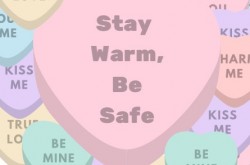Information to Help Keep You Safe.
February 12, 2016
Philadelphia and the surrounding counties are expected to see the coldest temperatures of the 2016 winter season this weekend, which Valentine’s Day happens to land on.
A holiday known for warm hearts and smiles, not teeth-chattering cold.
However, a National Weather Service Mount Holly briefing published yesterday said low temperatures Saturday night will range from minus 12 degrees in the Poconos to near above 5 degrees towards the Atlantic Coast. The real concern lies with the wind chill, making the Poconos feel like minus 30 degrees and dropping temps to minus 10 degrees through Philadelphia and South Jersey.
The Thursday weather briefing called this a dangerous cold to people, pets, and property.
Here is a collection of safety information from our Winter Weather Guide to help others, animals, and yourself:
- A Code Blue is issued when cold weather becomes a danger to homeless individuals who are without shelter. Philadelphia’s Office of Supportive Housing consults with the City’s Department of Behavioral Health to issue a Code Blue as a means to help the homeless get indoors during extremely cold weather conditions. If you see a person who is homeless and in need please call Project Home at 215-232-1984.
- Prolonged exposure to the cold can result in serious health problems, most common being hypothermia and frostbite according to the Philadelphia Department of Health.
- Hypothermia– Cold temperatures can cause your body to lose heat faster than it can be produced, which can cause hypothermia.
- When exposed to cold temperatures, your body begins to lose heat faster than it can be produced.
- Low body temperature may make you unable to think clearly or move well.
- You may not know you have hypothermia.
- If your temperature is below 95°, the situation is an emergency—get medical attention immediately.
- Frostbite- an injury to the body caused by freezing.
- Frostbite causes a loss of feeling and color in the nose, ears, cheeks, chin, fingers, or toes.
- Wind chill and wind speed affect the actual air temperature and perceived temperature as well as the amount of time until frostbite occurs. The higher the wind speed and lower the temperature, the quicker frostbite can set in. Anywhere from 5 to 30 minutes according to the CDC.
- Seek medical care if you think you have frostbite.
- Adults and children should wear:
- a hat
- a scarf or knit mask to cover face and mouth
- sleeves that are snug at the wrist
- mittens (they are warmer than gloves)
- water-resistant coat and boots
- several layers of loose-fitting clothing
- The American Society for the Prevention of Cruelty to Animals notes that winter’s “dry, cold air and chilly rain, sleet and snow can cause chapped paws and itchy, flaking skin, but these aren’t the only discomforts pets can suffer. Winter walks can become downright dangerous if chemicals from ice-melting agents are licked off of bare paws.” To remedy this, the ASPCA recommends keeping you home humidified and a dry towel waiting near your door to wipe your animals paws when they come inside.
- It is against City ordinance to leave pets outside in extreme cold and owners can be fined up to $500. Call the Animal Care & Control Team of Philadelphia (ACCT Philly) hotline at 267-385-3800 if you see a dog or other pet outside during extreme cold.
- A decrease in temperature means an increase in home heating. The Philadelphia Fire Department wants to remind you to NEVER use gas or electric ranges and ovens to heat your home. Also, NEVER store kerosene or other ignitable liquids indoors.
- Use your time inside wisely. Check your smoke and carbon monoxide detectors. If you do not have a smoke detector, the Philadelphia Fire Department will give you one. Contact the fire department or Philly 311.
- Philadelphia is known as a “City of Neighborhoods”, a moniker earned as residents look out for one another. The Philadelphia Police Department has reminded us of this before, asking to check on neighbors, especially those who are vulnerable, such as; the disabled, the elderly, and those without reliable heat. That will warm your heart!
- Avoid costly and unnecessary home repair costs. Frozen pipes can burst, leading to expensive plumbing tabs. The Philadelphia Water Department has numerous tips on an infographic and great news you can use, such as, “Let faucet run at a trickle overnight during extremely cold weather. It costs only pennies, and the moving water will help prevent the pipes from freezing.”
An easy, essential way to be prepared is to stay informed. Get emergency alerts from OEM’s ReadyPhiladelphia program sent to your phone or email to keep you informed prior to and during an emergency. Also, look for PhilaOEM on Twitter and Facebook.

